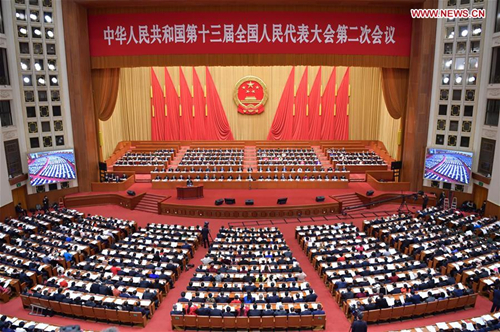MPs on Wednesday voted to prevent Britain from leaving the European Union (EU) unless a Brexit deal has been agreed with Brussels.
The no-deal option, rejected by a vote of 321 to 278, was a crushing defeat for British Prime Minister Theresa May.
The result could also lead to a number of resignations among May's ministerial team, after Conservative Party managers ordered its MPs to oppose the measure.
MPs began the non-binding vote at 1900 GMT on Wednesday, and voted by a margin of 43 to completely rule out no-deal Brexit, which led to a second government defeat in some 30 minutes.
Also on Wednesday, MPs voted by a margin of 210 to reject an amendment which calls on the British government to pursue a managed no-deal Brexit on May 22.
The result came just minutes after MPs voted by 312 to 308 to reject a no-deal Brexit at any time in the wake of Tuesday night's shattering defeat of May's Brexit deal.
The British government has lost by four votes on Wednesday night as MPs rejected a no-deal Brexit in the non-binding vote, which does not rule out Britain leaving the European Union.
The vote outcomes further weakened the authority of the prime minister, who has been fighting with a hoarse voice in the parliament to save her Brexit deal, which was rejected by the parliament by a margin of 230 in January.
But it means MPs could have another vote on Thursday to decide whether they want to ask Brussels for an extension to the March 29 departure date.
The speaker of the Commons, John Bercow, announced that the Thursday vote will set next Wednesday as a deadline for MPs to agree a Brexit deal.
If a Brexit deal is passed by then, the British government will seek an extension of Britain's departure date from the EU until June 30.
But if the deal is not passed by Wednesday the government will need a longer extension, requiring Britain to take part in European elections.
In what political commentators said was a night of chaos, MPs had earlier backed a measure aimed at stopping a no-deal option in any circumstances.
The success of that measure, won by 312 votes to 308, meant that the text of the main and final vote had to be changed to rule out an option of Britain leaving the EU without a deal.
Even with the latest defeat for May, the no-deal option will need a change in legislation to become enforceable.
After the result was announced, May said that the Wednesday vote does not change the fundamental problem that if MPs want to rule out a no-deal Brexit they must vote for a deal.
In Brussels, EU leaders demanded a "clear answer" about what Britain wants, and were preparing to take a hard line if, as widely expected, the British prime minister asks for a postponement of Brexit.
The EU's chief Brexit negotiator Michel Barnier insisted there would be no further offer from Brussels apart from the deal already on the table.
Earlier Wednesday, British Chancellor Philip Hammond signaled his backing for a cross-party consensus over Brexit, despite the PM still appearing to support her own deal.
He told MPs they had "a solemn duty in the days ahead to put aside our differences and seek a compromise."




















































